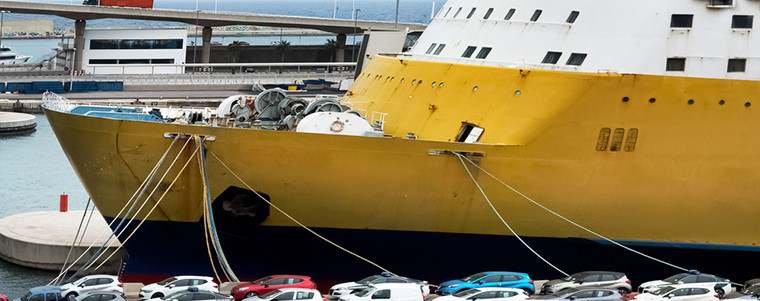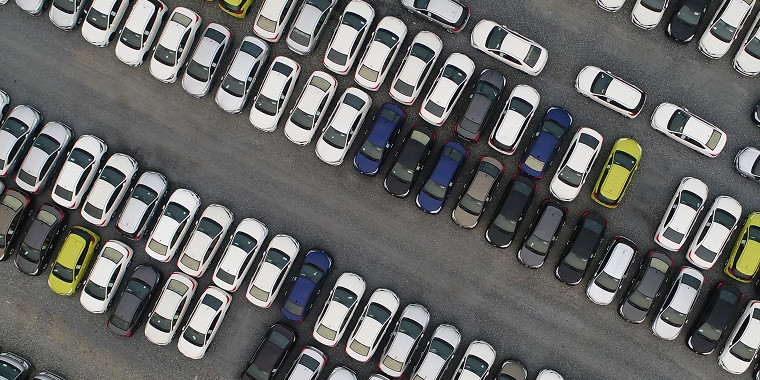
Aug 11, 2015 // Luisa Walendy
New car logistics - when cars are travelling
Puebla, Veracruz, Antwerp, Emden? What a route! But this is not the extraordinary pyramid tour of Dutch emigrants, but the exemplary distribution chain of German new cars.
Apr 18, 2018 // Luisa Walendy
Share
Updates about autonomous cars can be found in headlines seemingly on a daily basis: first tests, new areas of application, successful or even failed pilot projects. Topics such as digitalization and artificial intelligence are on the agenda in the automotive industry, and often, the industry even plays a pioneering role in the introduction of new technologies. However, a recent study shows that digitalization has not reached every part of the automotive industry. According to the study by INFORM GmbH, which asked 103 international companies from the vehicle logistics industry about their experiences with IT systems, about one in four respondents worked with software that was implemented more than eleven years ago. Only about half of the companies have invested in the expansion of modern IT systems in the past five years.
Obsolete software as a barrier
Based on the study, it can be assumed that the age of the systems leads to widespread dissatisfaction with the software, among other things. Respondents primarily see the weaknesses of IT systems in user-friendliness (47 percent), data collection and evaluation (42 percent) and lack of future viability (33 percent). But why are outdated systems still frequently used in vehicle logistics? Is this area of the automotive industry so far away from digital processes? For the majority of the participants in the study, costs that prevent the introduction of a new system play a decisive role. More than half of those surveyed named over-investment as the main reason. In addition, every third person has already had bad experiences with the implementation of an IT system in the past, and it is therefore difficult to introduce the new systems.
One reason for the bad experiences in the past could probably be an insufficient coordination of the respective software system with the operative processes. IT systems for automotive logistics often have a deep impact on companies' operational processes, so detailed and specialized consulting prior to implementation is essential.
But the study also shows that the introduction of new IT in vehicle logistics cannot simply be postponed: More than half of the logistics companies surveyed confirmed that IT equipment is a decisive competitive advantage.
Circumstances do not allow hesitation
The study, which was carried out for the first time in 2013 and therefore records developments over the last five years, also reflects the fundamental changes in the automotive industry. This is because the industry is undergoing a noticeable change due to digitalization, which is also having a considerable impact on vehicle logistics. Rising production figures and advancing internationalization play an important role in the automotive industry. 80 percent of those surveyed expect the volume of vehicles handled in the logistics sector to increase by at least 10 percent over the next five years, half of whom even anticipate an increase of over 20 percent.
In addition, the trend among German car manufacturers in particular, where more and more cars are being built abroad, is ongoing. Foreign production rose by seven percent to 10.8 million cars in 2017, while domestic production fell by two percent to 5.6 million vehicles. The Chinese car market is also gaining in importance. And the increasing importance of alternative drives is influencing logistics in the automotive industry as well. Production processes and value chains could change significantly as a result.
IT systems must be able to react to these changed conditions in the context of digitalization, internationalization and the growing number of variants, and therefore plan and control complex processes efficiently. According to the study, efficiency increases in operational processes (82 percent), better planning of incoming and outgoing deliveries (64 percent), flexibility in the event of deviations from the plan (64 percent), shorter processing and delivery times (63 percent) and the transparency of all vehicle data (58 percent) are the greatest challenges in vehicle logistics.
Conclusion
Supply chains and production processes in the automotive industry are becoming increasingly complex. Customers expect greater individualization, and the variety of automobiles is constantly increasing. Short innovation cycles demand flexibility and adaptability of logistics. Accordingly, the IT systems used are also challenged. The use of IT for the control of vehicle distribution and delivery processes is becoming increasingly unavoidable in order to counteract increasing competitive pressure. The continuous change in the automotive industry makes it necessary for both logistics processes and IT systems to be prepared for these developments and to always stay up to date. The industry has obviously recognized this point. Now it just has to implement it.
What major challenges do you see for vehicle logistics?
About our Expert